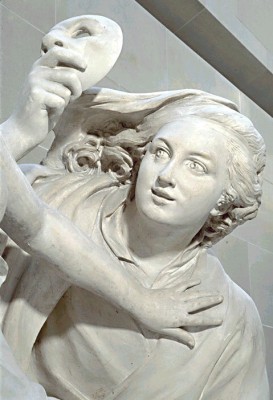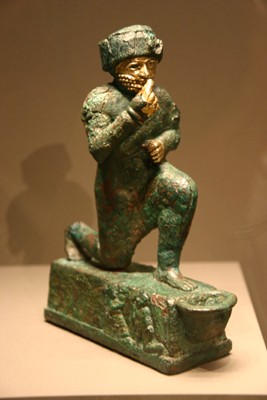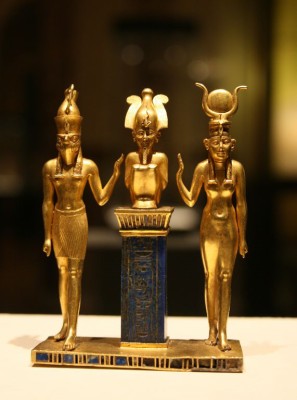
This site is an invitation to a journey.
A journey in space and time,
both distant and near, between
the shores of Babylon and the banks
of the Jordan River to the loops
of the Seine.
Beneath our eyes lay two monumental architectures. Firstly, that of
the Louvre, the modern-day guardian
of treasures and memories, one of
the world’s greatest museums.
Secondly, standing majestic,
the Bible, the book of books.
A journey in space and time,
both distant and near, between
the shores of Babylon and the banks
of the Jordan River to the loops
of the Seine.
Beneath our eyes lay two monumental architectures. Firstly, that of
the Louvre, the modern-day guardian
of treasures and memories, one of
the world’s greatest museums.
Secondly, standing majestic,
the Bible, the book of books.
The Louvre museum and the Bible
What should you read?
What should you see?
What is the best approach to take?
How can you find your bearings in
this huge labyrinth of objects and ideas?
Visit the Louvre with the Bible
therefore offers to assist the visitor,
the novice or the enlightened,
by proposing an itinerary marked out with
close to two hundred pauses for reflection,
from the most classical to the lesser known.
What should you see?
What is the best approach to take?
How can you find your bearings in
this huge labyrinth of objects and ideas?
Visit the Louvre with the Bible
therefore offers to assist the visitor,
the novice or the enlightened,
by proposing an itinerary marked out with
close to two hundred pauses for reflection,
from the most classical to the lesser known.

A new and original biblical journey

This chiefly cultural site presents
the research efforts of a Christian
for whom the Bible is authoritative.
A Christian who considers it not as
“the word of man, but, as it truly is,
the word of God.”
- 1 Thessalonians 2:13
Jesus Christ himself said:
“Your word is truth”. Therefore,
the Bible is integrally true.
On the strength of this naïve
but profound conviction, and following the example of my illustrious colleague, the doctor Luke, who “ having investigated everything carefully from the beginning, to write it out for you
in consecutive order”, your tour of the Louvre will open up a new perspective.
the research efforts of a Christian
for whom the Bible is authoritative.
A Christian who considers it not as
“the word of man, but, as it truly is,
the word of God.”
- 1 Thessalonians 2:13
Jesus Christ himself said:
“Your word is truth”. Therefore,
the Bible is integrally true.
On the strength of this naïve
but profound conviction, and following the example of my illustrious colleague, the doctor Luke, who “ having investigated everything carefully from the beginning, to write it out for you
in consecutive order”, your tour of the Louvre will open up a new perspective.

For this journey is more
than just a guided tour.
It will allow you to span periods and centuries and encounter
countries and peoples.
With time, it became clear that
a general subject heading
could be found, Hence we proposed
the sub-title, ‘ From Ancient Babylon
to Original Christianity '.
than just a guided tour.
It will allow you to span periods and centuries and encounter
countries and peoples.
With time, it became clear that
a general subject heading
could be found, Hence we proposed
the sub-title, ‘ From Ancient Babylon
to Original Christianity '.
With regard to these peoples of the past, everywhere the most surprising coincidences
are found in rituals, popular feasts and traditions
as well as in relationships with gods.
These common aspects may find
their biblical explanation in the dispersal
of humankind from Babylon.
This is most certainly a new and original biblical journey that can help each and every one of us
to question our trust in the Bible, and perhaps
allow us to distinguish the extent to which
historical reality surpasses legend owing to the omnipresent influence of this ancient civilisation.
Or one that simply shares the pleasure of discovering the Louvre with the Bible in hand
are found in rituals, popular feasts and traditions
as well as in relationships with gods.
These common aspects may find
their biblical explanation in the dispersal
of humankind from Babylon.
This is most certainly a new and original biblical journey that can help each and every one of us
to question our trust in the Bible, and perhaps
allow us to distinguish the extent to which
historical reality surpasses legend owing to the omnipresent influence of this ancient civilisation.
Or one that simply shares the pleasure of discovering the Louvre with the Bible in hand


Enjoy your visit!
Paris July 2011
Philippe Mattmann
< The Louvre, the Seine and
the Pont des Arts